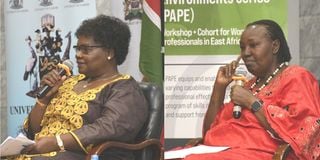Inside the lives of women shaping Kenya's foreign relations

Ann Nyikuli (left), retired ambassador and interim secretary of Former & Retired Ambassadors' Association, and Dr Sally Kosgei, former Foreign Affairs Permanent Secretary and Head of Public Service during a conference on women in diplomacy in Chandaria Auditorium, University of Nairobi, on February 20, 2024.
What you need to know:
- Addressing a conference on women in diplomacy at the University of Nairobi, accomplished women diplomats shared their unique experiences, challenges, triumphs and the pivotal roles.
- The women diplomats, in their clarion call, now want younger women not to cower from pursuing careers in international relations.
Embarking on a career in diplomacy is often daunting. For women diplomats, the path is even more difficult as they face extra challenges in a field mostly occupied by men.
Behind the polished image of diplomacy lies a world of discrimination and sexism. And women have to work harder.
Addressing a conference on women in diplomacy at the University of Nairobi (UoN) last Tuesday, accomplished women diplomats shared their unique experiences, challenges, triumphs and the pivotal role they played in shaping Kenya's foreign relations.
Anna Mutavati, the UN Women representative in Kenya, started by setting the scene of women’s gross underrepresentation in key positions in foreign policy, international relations, and peace and security.
“According to the United Nations, between 1992 and 2019, women in diplomacy represented only 30 per cent of negotiators, 6.0 per cent of mediators and only 6.0 per cent of signatories of peace processes worldwide,” she said.
Dr Sally Kosgei, who was Kenya’s long-serving High Commissioner to the UK, shared that when she joined the Ministry of Foreign Affairs in 1981, she was shocked to find only two women ambassadors (Margaret Kenyatta and Pamela Mboya) out of 24.
“Even when I was appointed High Commissioner to the United Kingdom, I was the only woman heading a diplomatic mission in a country where the heads of state (Queen Elizabeth II) and government (Margaret Thatcher) were women.
"I was also the youngest ambassador in London, a city where almost every country was represented. I felt unqualified,” Dr Kosgei said.
Her entry into diplomacy was not deliberate. She left her teaching job at the UoN with a plan to work in government for two years only.
“I had gone to work in the central government to hide. This is because a lot of my colleagues at the university were being harassed by the government of the day. People were being arrested for one thing or the other. It was also around that time that [former chief justice] Willy Mutunga was arrested,” she said.
However, a conversation she had with Ms Kenyatta (then Kenya’s representative to Unep) altered her plans.
Underrepresented
“Margaret knew I was hesitant about working in diplomacy and that I intended to return to academia. She told me there were more women in academia than at the Ministry of Foreign Affairs.
"So she asked me to stay because after she and Pamela retired, there would be no more women.”
Incidentally, when Margaret retired from Unep five years later, it was Dr Kosgei who replaced her.
Also read: African women trailblazing beyond their 50s
Her career, though illustrious, was littered with surprising moments of sexism. For instance, she was often mistaken for a man because of her name’s initials: SJ Kosgei.
“I remember Kenya’s ambassador to Nigeria came into my office (in London) and found me seated in my chair. He told me, ‘You are a bad secretary! Sitting on your boss's chair, can you get up? When he discovered that I was supposed to be there, he went out and never came back,” she says amidst a laugh.
Again, when she was in Harare, Zimbabwe, a visiting delegation would not shake hands with her because she was a woman and they were Iranians.
Those instances made Dr Kosgei realise she had to be the most competent diplomat in the room because most people underestimated her.
“I spent a lot of my time listening to my colleagues, reading as much as I could and getting advice from them.
"Three ministers constantly sent me to buy them books. These were William ole Ntimama, Zachary Onyonka and Bob Ouko.
"Naturally, I also began reading like them. If someone asked a question on diplomacy, I had to know. I made myself indispensable."
Dr Kosgei also debunked the myth that all diplomats are political appointees. Dr Kosgei insisted that she was not politically appointed as “politics just found me in the job.”
The director general of Foreign Service Academy, Prof Paul Ndung’u, admitted that in the past, women were not entrusted with high-level roles in diplomacy as it was believed that they couldn't keep secrets or were not strong negotiators to advocate a country’s interests.
However, Ann Nyikuli, who served as Kenya’s ambassador to five countries and five UN agencies, put those beliefs to shame. Ms Nyikuli joined Foreign Affairs in 1985 after working in other government departments.
“Being asked to cover five countries and five UN agencies, as a woman, was a bit daunting. But we, women, have a willingness to step into different roles and we do it like second nature, so we managed because I had a formidable team led by Ambassador Solomon Maina.”
Despite her heavy docket, she was up to the task. There were also significant gains in collaboration with Turkey in education and economics.
Ms Nyikuli even brokered commercial agreements with Italy that saw Kenya export its flowers to Europe for the first time.
The women diplomats, in their clarion call, now want younger women not to cower from pursuing careers in international relations.
“If I went in as confused as I was, not sure what I wanted to do, I think you (young women) have a better chance. You should be encouraged and have confidence,” Dr Kosgei advised.





